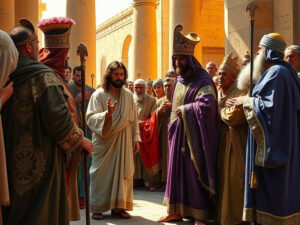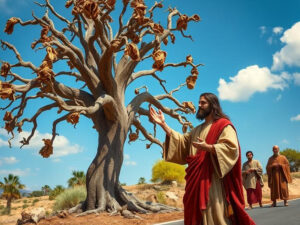
Jesus speaking with the rich young ruler
Before reading this commentary, I encourage you to first read the text of Matthew chapter nineteen.
Verses 1-2
When Jesus had finished saying these things, (i.e. the end of chapter 18), He left Galilee and went into the region of Judea beyond the Jordan. Large crowds followed Him, and He healed them there.
Verse 3
The Pharisees continue to search for any opportunity to accuse Jesus of something. They search and search, as though their greatest desire is to validate their rejection of the one person who is most obviously the Messiah.
Today is no different, there are individuals who will search the Bible in order to find something (anything), with which they can accuse God, Jesus, Christians, of wrong doing. When you approach the Bible, it should always be from a position of humility, prayer, and a desire to know God better. That’s when God will give to you an understanding of scripture. Otherwise, God has the ability to keep the bible’s secrets hidden from you, even if you read it.
So the Pharisees ask, “Is it lawful for a man to divorce his wife for any reason?” Again, they’re not asking because they want to know the answer. They’re asking because they are seeking a reason to accuse Jesus of something. This is why the verse says they came to test him.
Verse 4
Jesus answered, “Have you not read….” Recall that when Jesus was tempted by Satan in the desert, on every occasion that Jesus presented a counter argument to Satan, Jesus used the Word of God to rebuttal and rebuke Satan. He is doing the same thing here while speaking to the Pharisees. “Have you not read” is Jesus’s reprimand to the Pharisees for not knowing the Word of God. The Pharisees are supposed to be experts in the law, yet they come to Jesus and ask questions they should already know the answer to.
We too should know the Word of God well enough to be able to rebuttal any, and rebuke any deceit or demonic influence. Furthermore, knowing well the word of God is ultra-valuable because it contains most of the answers people are looking for.
By the way, when you ask God a question in prayer and you hear only silence, (i.e., when you ask God something and He doesn’t answer), many times it is because the answer is in the Bible. Here’s what you should do when you ask God something in prayer but hear only silence. First, refer to James 1:5 which says,
Now if any of you lacks wisdom, he should ask God, who gives generously to all without finding fault, and it will be given to him. (James 1:5)
Regardless of what the subject matter is, if you are asking any question of God, you are asking for wisdom. Recite this verse in your prayer. Then, if you hear only silence, sit down with your Bible and ask the Lord where He wants you to read. (I’m not suggesting you flop open the Bible to a random page and there expect to find your answer. Doing that can often lead to the Bible being taken out of context). Rather I am saying, when you present your Bible reading to the Lord through prayer, there may be occasions in which you feel strongly compelled to turn to a particular book, chapter and verse.
Verses 5-6
In addressing the Pharisees, Jesus answered, “from the beginning the Creator ‘made them male and female,’ and said, ‘For this reason a man will leave his father and mother and be united to his wife, and the two will become one flesh’? So they are no longer two, but one flesh. Therefore what God has joined together, let man not separate.”
“For this reason a man will leave his father and mother and be united to his wife”.
There is a reason why many teenagers do not get along with their parents. They are being prepared to leave their father and mother and be united to a spouse. God has put into our DNA the desire to leave our parents. That code in our DNA begins to express itself when we’re teenagers. Much like baby sea turtles running across the sand in order to get into the ocean. Why don’t the baby turtles just hang out on the beach all night? There is something within their DNA that says “get to the water!” and they are compelled to do so. In the same way, when a young person is approaching that time in life where they ought to go out into the world and find a spouse, something happens within them that causes them to begin to dislike living with their parents. Mind you, I am not suggesting a 13-year-old should leave their parents, rather I am suggesting this instinct begins preparing them to eventually do so.
My opinion: If you are 20 years old or more, and you’re still living with your parents, you should begin organizing your finances, polishing your resume, researching places to live, and set a goal to move out. That being said, there’s obviously exceptions. A single parent, a person with a disability, or someone who encountered financial devastation might need to remain longer with their parents.
The reverse is also true, once you leave your parents home, it should be your goal to have a wonderful relationship with them. And to all adults who do have a good relationship with their parents, give praise to the Lord. However, if you have a parent who feels it’s their place to meddle in your marriage, (and this is more often someone’s mother, rather than their father) I would encourage you to consider putting some distance between you and they.
My mother always felt it was her place to insert herself into my marriage. Long after I had left home, gotten married, bought a house and a dog, my mother continued to treat me as if I were 12 years old. Sometimes she would arrive at our house unannounced and would come in and begin scolding me in front of my wife for some perceived offense I had unknowingly done to her. I was envious of my two sisters because when they left home, one moved 1,900 miles away and the other moved 899 miles away. Because of my job, however, I remained in the same town as my parents. I found no relief from my mother until we finally boxed everything up and moved to Ohio (and I having had to quit a good job to do so).
“The two will become one flesh, so they are no longer two, but one flesh.”
This verse is perplexing. What does it mean, “The two become one flesh”? Some people, when asked what this verse is referring to, respond by saying “sex; it’s referring to sex.” But the verse says “what God has joined together, let man not separate.” Obviously, it’s not suggesting that married couples should never cease having sex. That would be weird.
Furthermore, we know that Paul wrote the following:
It is good to abstain from sexual relations. But because there is so much sexual immorality, each man should have his own wife, and each woman her own husband.
The husband should fulfill his marital duty to his wife, and likewise the wife to her husband. The wife does not have authority over her own body, but the husband. Likewise the husband does not have authority over his own body, but the wife.
Do not deprive each other, except by mutual consent and for a time, so you may devote yourselves to prayer. Then come together again, so that Satan will not tempt you through your lack of self-control. I say this as a concession, not as a command. I wish that all men were as I am. But each man has his own gift from God; one has this gift, another has that. (1 Corinthians 7:1-7)
However, Paul also wrote:
Do you not know that your bodies are members of Christ? Shall I then take the members of Christ and unite them with a prostitute? Never! Or don’t you know that he who unites himself with a prostitute is one with her in body? For it is said, “The two will become one flesh.” But he who unites himself with the Lord is one with Him in spirit. (1 Corinthians 6:15-17)
This indicates that two becoming one flesh is in fact about sex, but perhaps there is more to it than just that.
Let’s take a look at exactly where the phrase originates:
So the LORD God caused the man to fall into a deep sleep, and while he slept, He took one of the man’s ribs and closed up the area with flesh. And from the rib that the LORD God had taken from the man, He made a woman and brought her to him. And the man said:
“This is now bone of my bones and flesh of my flesh; she shall be called ‘woman,’ for out of man she was taken.”
For this reason a man will leave his father and mother and be united to his wife, and they will become one flesh. (Genesis 2:21-24)
So in this context, Eve was literally made from Adam’s bone. When Adam received Eve, he was receiving his own flesh back to himself, (i.e. he was receiving back his own rib).
If a person donates bone marrow or a kidney, do they and the recipient become one flesh? I don’t think so, because the verse appears to be specifically about marriage.
Coming back to the context in Matthew, marriage today does not consist of creating a man’s wife from one of his ribs. Two relatively unrelated people meet, fall in love, and get married. Why are they then considered one flesh?
Some have suggested that being of one flesh is merely referring to a partnership or to a mutual commitment. But that can not be the case because two individuals who start a business together make commitments to one another and are in a partnership but they do not become one flesh.
Some have said the verse would make more sense if it said married couples are united in spirit. However, having one spirit would make little sense in the context of what happens when those two people go to heaven? They would obviously not be one soul in heaven. And what if one went to heaven and the other went to hell, how would that work out if they were one spirit?
Furthermore, Jesus said, “in the resurrection, people will neither marry nor be given in marriage. Instead, they will be like the angels in heaven” (Matthew 22:30)
Marriage only lasts while we are alive on this earth and our flesh only lasts while we are alive on this earth. But our soul / spirit, goes to heaven where it lasts forever and there we are married to Christ.
Marriage between a man and a woman represents the marriage between Christ and the church. See the following verses: Ephesians 5:25-27, Revelation 19:7-9, Revelation 21:2, Revelation 21:9, 2 Corinthians 11:2, Matthew 9:15, Matthew 22:1-14, Matthew 25:1-13, Hosea 2:19-20, Isaiah 62:5
Therefore, anyone who cheats on their spouse represents the church cheating on Christ. That’s not a good look, to say the least.
This comparison of a marriage as being like that of the relationship between Christ and the church is continued by Paul in the book of Ephesians. Paul writes:
Pay careful attention, then, to how you walk, not as unwise but as wise, redeeming the time, because the days are evil. Therefore do not be foolish, but understand what the Lord’s will is. Do not get drunk on wine, which leads to reckless indiscretion. Instead, be filled with the Spirit.
Speak to one another with psalms, hymns, and spiritual songs. Sing and make music in your hearts to the Lord, always giving thanks to God the Father for everything in the name of our Lord Jesus Christ. Submit to one another out of reverence for Christ.
Wives, submit to your husbands as to the Lord. For the husband is the head of the wife as Christ is the head of the church, His body, of which He is the Savior. Now as the church submits to Christ, so also wives should submit to their husbands in everything.
Husbands, love your wives, just as Christ loved the church and gave Himself up for her to sanctify her, cleansing her by the washing with water through the word, and to present her to Himself as a glorious church, without stain or wrinkle or any such blemish, but holy and blameless.
In the same way, husbands ought to love their wives as their own bodies. He who loves his wife loves himself. Indeed, no one ever hated his own body, but he nourishes and cherishes it, just as Christ does the church. For we are members of His body.
“For this reason a man will leave his father and mother and be united to his wife, and the two will become one flesh.” This mystery is profound, but I am speaking about Christ and the church. Nevertheless, each one of you also must love his wife as he loves himself, and the wife must respect her husband. (Ephesians 5:15-33)
In these verses we see that the church submits to Jesus Christ and that Christ loves the church. Christ loved the church so much that he was willing to die in their place. By dying on the cross, Jesus sanctified the church so that we (the church) could be presented to Him without blemish.
All of this is represented by marriage. From the first human beings, God meant for marriage to represent what he was going to do for the church, (for those who put their faith in Him).
But verses 31 & 32 contain the essence of what we are looking for here at this moment.
“For this reason a man will leave his father and mother and be united to his wife, and the two will become one flesh.” This mystery is profound, but I am speaking about Christ and the church.” (Ephesians 5:31-32)
Recall from my commentary on Matthew chapter 13, where I wrote a great deal about the kingdom of heaven having many mysteries. Paul is telling us that this verse, “The two becoming one flesh” is itself one of these mysteries. However, he immediately explains it to us, “I am speaking about Christ and the church”.
When we put our faith in Jesus Christ, the Holy Spirit comes to abide within us. Thus, we (the church) are one with Christ in that the Holy Spirit is living within us. Marriage represents this relationship between Christ and the church. Thus, the two becoming one flesh, represents the marriage between Christ and church, the two becoming one (Christ dying for us to make us pure, and we being filled with the Holy Spirit, to become one with Christ).
Therefore, any deviation from what God intended marriage to be, represents a deviation from, (a rejection of), what Christ has done for the church. Thus, sex before marriage, cohabitation without marriage, casual hookups, wedding ceremonies that exclude God, viewing marriage as merely a legal contract, adultery, pornography, open marriages, gay marriages, gender fluidity and non-binary marriage, divorce, and the no-fault divorce culture, all represent a deviation from what God intended marriage to represent and thus, represents a rejection of what Christ did to redeem us.
This is why marriage should be taken very seriously. As Jesus stated, what God has joined together, let man not separate.”
Verses 7-9
“Why then,” the Pharisees asked, “did Moses order a man to give his wife a certificate of divorce and send her away?” Jesus replied, “Moses permitted you to divorce your wives because of your hardness of heart. But it was not this way from the beginning. Now I tell you that whoever divorces his wife, except for sexual immorality, and marries another woman commits adultery.”
If your spouse cheats on you (sexual immorality), you may divorce. Otherwise it is better to work out your problems.
There are some people, however, who, because of this verse, believe that if their spouse divorces them, they must spend the rest of their life alone and lonely. But let’s look at what it says in 1st Corinthians,
if the unbeliever leaves, let him go. The believing brother or sister is not bound in such cases. (1 Corinthians 7:15)
Verses 10-11
His disciples said to Him, “If this is the case between a man and his wife, it is better not to marry.” “Not everyone can accept this word,” He replied, “but only those to whom it has been given.
Notice that Jesus is agreeing with them. Yes, it is better that a person not marry, however, Jesus says that this only applies to those it has been given not to marry. If you have any desire whatsoever to fall in love, to be in a romantic relationship, to date, to find a boyfriend or girlfriend, or to someday get married, you are not one of these people to whom life long singleness has been given.
Verse 12
Describes the type of people to whom lifelong singleness has been given.
Verses 13-15
The disciples viewed their activities with Jesus as adult stuff, and wanted to send away the children. Jesus, however, takes the opportunity to tell those around him that the kingdom of heaven belongs to those who, like little children, are completely humble.
Verses 16-24
Just then a man came up to Jesus and inquired, “Teacher, what good thing must I do to obtain eternal life?” This man’s question demonstrates he is starting off this conversation with an incorrect assumption. “What must I DO to go to heaven?”
He is assuming that something he does will earn him his entrance into heaven. This is an error. And 2,000 years later, not much has changed. Most people, when asked how a person gets into heaven, they will respond with “by being a good person”. However, that is not correct.
We’re about to see that Jesus is setting up this conversation with the rich young man to reveal the man’s shortcoming and to give him the true answer he’s looking for regarding the true paths to eternal life.
“Why do you ask Me about what is good?” Jesus replied. “There is only One who is good…”
Jesus is giving this man a big hint. By saying, “There is only One who is good”, Jesus is hinting at the fact that this rich young man is not the one who is good. Jesus is hinting at the fact that the rich young man doesn’t have within himself, what it takes to obtain eternal life.
Then Jesus sets up the conversation to reveal the man’s shortcoming. Jesus says, “If you want to enter life, keep the commandments.” (Jesus knows, and we, the readers, know that this is not the correct answer), but watch what happens next.
“Which ones?” the man asked. He is still thinking that he is the one who’s going to become so holy that he will be capable of walking himself into the kingdom of heaven.
Jesus proceeds to rattle off a few of the ten commandments. “All these I have kept,” said the young man. “What do I still lack?” (Oh, here we go. Set up complete. Now for the slam dunk).
Jesus told him, “If you want to be perfect, go, sell your possessions and give to the poor, and you will have treasure in heaven. Then come, follow Me.”
Now let’s examine carefully what Jesus just said. “If you want to be perfect, sell your possessions and follow me.” What makes us perfect in God’s eyes? Jesus!
Notice that the selling of possessions doesn’t earn the man salvation, it only gives him treasures in heaven. Following Jesus is the key to our entrance into heaven. However, Jesus knows that this rich young man puts his trust in his money rather than in God. That’s why Jesus is challenging him to sell it all and give it to the poor.
In the United States most people rely upon their money rather than Jesus. Here’s an example, you have $1,000 in your bank account. You’re driving in your car and you find yourself getting hungry. You know that at the next intersection is your favorite take out restaurant. What do you do? Without giving any thought to the Lord’s provision, you pull into the restaurant, walk in, place your order, pick up your food, walk out and continue on your journey home. Never once having even given a thought to how God provides for you. That is an example of relying upon your money, rather than God. Oh, and by the way, if you have a job in the United States, I can almost guarantee you that you have more money than the rich young ruler from these Bible verses we’re examining now.
Do you need to sell all your possessions? I would encourage you to have a minimalist attitude toward material possessions, but the point is not that you own something or do not own something (that again, would be trying to earn salvation), rather, the point is your attitude toward your money and possessions. Get rid of the things in your life that prevent you from following Jesus. Get rid of the things in your life that distract you from Jesus.
When the young man heard Jesus’s instruction (to sell his possessions and come follow him), he went away in sorrow, because he had great wealth.
Every sermon I’ve ever heard about this rich young man, concluded that by going away in sorrow, he chose not to do what Jesus said. I totally disagree. Every time I have heard a sermon in which the pastor concluded that the rich young man rejected Jesus in favor of his wealth, I’ve had to shake my head. Here’s why:
Noticed that he didn’t go away indignant. He didn’t go away in protest. He didn’t go away mad. He went away in sorrow. What is it that made him sorrowful? He was picturing in his mind how uncomfortable and how difficult it was going to be to sell all his possessions and give to the poor. He was aware of the fact That what he needed to do was going to be for him a very big sacrifice.
Isn’t this the case with us today as well? Not everything that Jesus tells us to do is going to be convenient and comfortable. God’s will for our lives is not always going to cause us great joy in which we are celebrating, jumping up and down shouting hallelujah. Sometimes the things that Jesus asks us to do are going to make us sad, discouraged, at times perhaps even fearful.
Then Jesus told His disciples, “If anyone wants to come after Me, he must deny himself and take up his cross and follow Me. For whoever wants to save his life will lose it, but whoever loses his life for My sake will find it. (Matthew 16:24-25)
There will be times in your Christian walk in which following Jesus is going to be uncomfortable, painful, and in some cases dangerous, but even in our sadness, discouragement, or fear, we’re going to walk in faith and go do it anyway. This is what I believe the rich young ruler did. The fact that he was sorrowful about getting rid of his possessions shows me that he understood the sacrifice he would have to make in order to follow Jesus. I believe he went away and did what Jesus said.
After the man departed in sorrow Jesus said to his disciples, “Truly I tell you, it is hard for a rich man to enter the kingdom of heaven. Again I tell you, it is easier for a camel to pass through the eye of a needle than for a rich man to enter the kingdom of God.”
When Jesus said it’s easier for a camel to go through the eye of a needle then for a rich man to get into heaven, he is not suggesting that the balance of your checking account prevents you from getting into heaven. He’s not saying $1,000 will condemn you but $999 is OK. What Jesus is saying is that rich people rely upon their money rather than relying upon God. It is that lack of faith which causes the rich to not be able to enter into the kingdom of heaven.
This verse is also not about a small gate that a camel has to get down on his knees to go through. I believe that interpretation is complete baloney. Rather, the verse is about how a person is saved. A person is only saved through faith in Jesus Christ. You cannot put reliance (trust…i.e. faith) upon your money.
And let me also say that if you make $38,000 a year or more, you are one of the richest people in the whole world. There are 8 billion people in the world, but most Americans define wealth as being in the millions of dollars. When people in America talk about wealth, they often think of individuals such as Bill Gates, Elon Musk or Jeff Bezos who each have billions of dollars at their disposal. But the type of “rich” that Jesus is talking about is one in which we Americans need to compare ourselves to the other 8 billion people in the world. If you are reading this commentary on a smart phone, you are among the richest people in the world.
When you and I have plenty of money in the bank, it’s very easy to spend less time thinking about God. This is because we rely on our money rather than God. Make a habit of giving thanks for everything you purchase.
In a previous commentary I told the story of nearly running out of gas on a 14-mile stretch of highway. When I realized the needle was below the “E” on the gauge, I prayed the whole way that God would prevent me from running out of Gas. But on all other occasions when I’ve driven the same stretch of road with plenty of gas in the tank, I didn’t even give one single thought to God’s provision. This is an example of relying upon money.
Make the habit of relying solely upon Jesus and not upon your money. When you have financial abundance and all your bills are paid, give thanks to God.
Verses 25-26
When the disciples heard this, they were greatly astonished and asked, “Who then can be saved?” Jesus looked at them and said, “With man this is impossible, but with God all things are possible.”
This verse is pivotal to the entirety of the Christian faith. For man (in other words, for people), it is absolutely impossible for you to save yourself. There is no amount of good deeds which can be done to save yourself. With man, it is impossible. Note the word being used here is “impossible”. I want to emphasize that again in all capital letters IMPOSSIBLE. There is no possible way that you can enter into the kingdom of heaven by being a good person. We do not earn salvation by doing good deeds. We do not earn favor with God by reading our Bible or going to church or attending prayer meetings.
There are many Christians who think that when they go to church every week and participate in a Bible study, that they are somehow earning God‘s favor. That they are somehow making themselves right with God. Jesus is telling us it’s impossible.
There are some people who think that if they volunteer and help the needy, and feed the poor, and take care of widows and the elderly, that they are earning God‘s favor. But Jesus is telling you that it is impossible.
Let me give the reader this advice. If you’re gonna go to hell, I would rather you spend your life being wild and having fun because this life is the only opportunity in all of eternity that you will have to experience joy. So, if you think that living some sort of obedient, sacrificial lifestyle is going to make you more holy or more righteous or more favored by God, you are wasting your time because that is impossible. You might as well eat, drink, and be merry, for tomorrow you’re gonna die (Isaiah 22:12-13).
I live in a part of the country where there are many Amish people and I associate with them on a somewhat regular basis. When I first came to this area, I assumed that because the Amish made such enormous sacrifices against their lifestyles for the sake of religion, that they would also be studious Bible scholars. However, it has never surprised me more to find out that despite all the tremendous sacrifices they make against their own lives, most of the Amish remain totally ignorant of God’s word.
The Amish people choose to live like as if it’s still the 1800’s. They don’t own cars. They ride in buggies pulled by horses. And they make many other sacrifices against modern amenities. So when I told a certain Amish man that I would meet him at a location that was approximately 10 miles from his home he said it was too far for his horse and asked me if I would come and pick him up in my car. I did and as we drove to our destination, we had a conversation about life and God and other miscellaneous topics. What surprised me was that he was barely familiar with the bible verses he struggled to quote during our conversation. He could scarcely remember even the simplest of scripture.
How do we get into the kingdom of heaven? Only with God is it possible. Only God can open the pathway that lets you get into heaven. And that pathway that he opened was through his son Jesus Christ, who died on the cross for the remission of your sins. That is what you must put your faith in.
Everything else that you do as a Christian is out of love for Jesus Christ and because you want to follow Jesus.
When I first began writing this commentary, I wrote approximately the first 15 or 16 chapters in which I repeatedly said that if a person wants to grow in their relationship with God, they ought to read their Bible, go to church, pray, fellowship with Christians, etc… Recently, however, I attended a Bible study in which one individual gave a testimony stating that he had previously thought that performing such actions (going to church, reading his Bible, praying) made him more favorable to God. He wrongly assumed that growing in one’s relationship with God meant that we had to do things that earned love.
The moment he said that, it occurred to me that some people might read what I wrote in these commentaries and conclude that growing closer to God means the same thing as finding favor with God. Despite the number of times I have already edited these commentaries, I seriously considered going back and searching through every commentary I had already written and editing them once again in order to clarify that pursuing Jesus and growing closer to God does not in any way earn you good standing with God.
Growing closer to God is not the same thing as having God love you more or having God consider you worthy. Instead, we put our faith in God. We then go to church, read the bible, pray, attend bible studies and the like because we want to gain a greater understanding of God’s will for our lives.
Remember what I said in a previous chapter that faith is not only believing that God exists, and that Jesus died on the cross, and rose from the dead and ascended into heaven, but faith also means that you believe that what Jesus said is true. Faith means you trust that what Jesus said is correct. Thus, if you put your faith in Jesus Christ, you will desire to do the things he said. That is faith.
Now, having said that, when we grow closer to God, it does not mean we are finding greater favor with God, rather it means we are learning more about what God‘s will is for our life and we are embracing that will by choosing to do the things God has said do. By growing closer to God, we grow in wisdom and understanding. But at no time does the pursuit of Jesus, regardless of what those activities are, make you more righteous in God‘s eyes. Rather it is the sacrifice that Jesus Christ made for you that causes you to be righteous. It is when you put your faith in the sacrifices that Jesus made for you, that you are viewed as righteous.
If you’re a Christian, do not think to yourself that by reading your Bible, by going to church, by associating with other Christians, by spending time in prayer, that you are causing God to approve of you. That is not the case. That’s not how this whole thing works.
Okay, so some will say, “well great! I don’t need to go to church, and I don’t need to read the Bible, and I don’t need to fellowship with other Christians.” That, however, would be an ignorant conclusion.
If you love the Lord Jesus Christ, you will pursue him because you want to know him more. Not because you want him to love you more. Pursuing God through Bible study, prayer, church, and fellowship is an act of gaining a greater understanding of God’s will for your life rather than trying to make God see you as being better than the guy standing next to you.
Verses 27-30
“Look,” Peter replied, “we have left everything to follow You. What then will there be for us?”
Jesus said to them, “Truly I tell you, in the renewal of all things, when the Son of Man sits on His glorious throne, you who have followed Me will also sit on twelve thrones, judging the twelve tribes of Israel. And everyone who has left houses or brothers or sisters or father or mother or wife or children or fields for the sake of My name will receive a hundredfold and will inherit eternal life. But many who are first will be last, and the last will be first.
This is an end times prophecy. At that time these disciples: Peter, Andrew, James, John, Philip, Bartholomew, Thomas, Matthew, James the son of Alphaeus, Thaddaeus, and Simon the Zealot will sit as judges over the twelve tribes of Israel.
Everyone who made sacrifices to be able to follow Jesus will get back a hundredfold what they gave up, not to mention eternal life.












